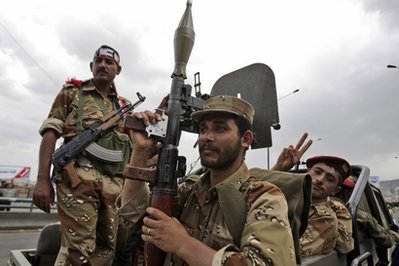After 3 months of peaceful anti-government demonstrations led by university students, Yemeni President Ali Abdullah Saleh, has refused to step down. Now, the fight against Saleh has taken a new turn—from street protests to urban warfare. At the forefront of the fight against Saleh is the country’s most powerful tribesman Sheik Sadeq al-Ahmar.
For about a week now, student activists and other civilian leaders have remained perplexed and somewhat bewildered as they watched their movement being sidestepped to pave the way for a military showdown between the two belligerents. Both sides are heavily armed and reports out of Sanaa this morning could not more terrifying. Associated press reported that Ali Saleh was wounded when militia loyal to al-Ahmar determined to topple him launched a blistering attack on the presidential that left Saleh wounded and 7 of his palace guarded killed.
As we are writing this piece, it is unclear as to where Saleh is. But this latest incident signals a major escalation of nearly two weeks of fighting with government forces. The attack was a stunning hit on Saleh’s leadership, striking a mosque in the palace compound where the president and top officials were praying.
According to news reports, Saleh was taken to the Defense Ministry, where a spokesperson claimed repeatedly that Saleh would appear to the public soon, but eight hours later state TV aired only an audio message from the president, speaking over an old still photo of him.
“If you are well, I am well,” Saleh said in the brief message, addressing Yemenis. He spoke in a labored voice, his breathing at times heavy. He blamed the rocket attack on “this armed gang of outlaws,” referring to the tribal fighters, and called on “all sons of the military around the country to confront” them.
According to a government spokesman, Saleh had suffered slight neck injuries. The official spoke on condition of anonymity because he was not authorized to talk to the press. Deputy Information Minister Abdu al-Janadi spoke only of “scratches on his face.”
 It was the first time that tribal fighters have directly targeted Saleh’s palace in fighting that has rocked the capital since May 23. The violence comes as nearly four months of protests have failed to oust Yemen’s leader of 33 years.
It was the first time that tribal fighters have directly targeted Saleh’s palace in fighting that has rocked the capital since May 23. The violence comes as nearly four months of protests have failed to oust Yemen’s leader of 33 years.
Sanaa residents have been hiding in basements as the two sides duke it out with artillery and gunbattles, shaking neighborhoods and sending palls of smoke over the city. Earlier Friday, intense government shelling flattened the homes of two tribal leaders and a military general who also joined the opposition.
The United States has been taking a low key approach to the 3-month old anti-Saleh movement, hypocritically urging Saleh to exercise restraint in the hope he might have been able to crush the opposition. It didn’t happen, and now an all out civil war looms and appears unavoidable unless Saleh leaves, and leaves fast.


